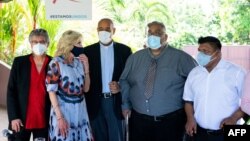Successful US AIDS Relief Program Faces Challenge in Congress

A 20-year-old, U.S.-funded AIDS relief program that is credited with saving tens of millions of lives around the world may not be reauthorized if conservative and anti-abortion activists are successful in a campaign against it.
The President’s Emergency Plan for AIDS Relief (PEPFAR) was launched in 2003 by then-President George W. Bush, and since then it has channeled more than $110 billion in support for the fight against the AIDS epidemic in more than 50 countries around the world.
It has been particularly successful in Western and sub-Saharan Africa, where it helps provide antiretroviral medication to the more than 25 million people who are living with the disease.
The program received $6.9 billion in fiscal 2023. Through its history, the program has typically been reauthorized for five years at a time, in order to provide some certainty about the flow of relief dollars. It was last authorized in 2018. Advocates of the program are calling for a “clean” reauthorization that does not alter the program or introduce uncertainty about the flow of funds.
However, that reauthorization is now in doubt, as conservative lawmakers and activists have expressed concern that the program works with various organizations around the world that, in addition to combating AIDS, provide reproductive health services, including abortion.
‘Radical’ ideology
In a joint letter to key members of Congress this spring, dozens of anti-abortion groups urged lawmakers to reconsider their support for the program unless new rules are put in place that restrict the way it can spend federal funds.
“The American people do not support using taxpayer dollars to fund abortion at home or abroad,” the groups wrote. “For that reason, there exists long-standing precedent not to fund abortion, directly or indirectly, through U.S. foreign assistance. We are concerned that grants from the President’s Emergency Plan for AIDS Relief (PEPFAR) are used by nongovernmental organizations that promote abortions and push a radical gender ideology abroad.”
Failure to reauthorize the program would not necessarily kill it, because Congress could still appropriate money for it each year. But it would chip away at the administrative foundation of PEPFAR, leaving it less able to adapt to changing conditions in countries participating in the program, including changes in local laws that affect the provision of specific kinds of aid, and changes in the prevalence of the virus.
Pressuring lawmakers
Several influential conservative organizations, including the Heritage Foundation, Family Research Council and Susan B. Anthony (SBA) Pro-Life America, have said that they oppose a clean reauthorization of the program. They said they would add any vote that renewed the program without changes to their legislative scorecards.
Those scorecards, which track lawmakers’ adherence to the wishes of conservative activist organizations, are influential because a low score can leave a member of Congress open to a reelection challenge from a more conservative rival.
Autumn Christensen, vice president of public policy for SBA Pro-Life America, said in a statement emailed to VOA that her organization believes the Biden administration has “bowed to the pressures of the international abortion lobby and integrated broader sexual and reproductive services (which includes abortion) into their strategic plans.”
Christensen praised legislation proposed by Representative Mario Diaz-Balart, a Florida Republican, that would reauthorize PEPFAR for a single year and explicitly deny any funding to organizations that “promote or perform” abortions.
Mexico City policy
Those advocating for a clean reauthorization of PEPFAR point out that it is already illegal under U.S. law for foreign aid funds to be spent on the delivery of abortion services.
A 1973 provision of the Foreign Assistance Act, known as the Helms Amendment, reads, “[N]o foreign assistance funds may be used to pay for the performance of abortion as a method of family planning or to motivate or coerce any person to practice abortions.”
That language has, for generations, blocked direct funding of abortion with U.S. aid. However, it has not blocked U.S. aid programs from providing funds to organizations that provide access to abortions using funds from other sources.
Opponents of a clean PEPFAR reauthorization are demanding that stronger anti-abortion protections, such as the “Mexico City policy,” be incorporated into the program.
First adopted in 1983 by President Ronald Reagan’s administration, the policy bars U.S. aid from being disbursed to any organization that provides access to abortion services, even with non-U.S. money.
Since its original introduction, the Mexico City policy has been rescinded by every Democratic presidential administration upon taking office and has been reinstated by every Republican.
Former President Donald Trump not only reinstated the policy early in his presidency, but he strengthened it. By 2019, it was U.S. policy to refuse to provide funds to groups that even spoke in favor of abortion rights or supported other organizations that did.
President Joe Biden reversed Trump’s reinstatement of the policy when he took office in 2021.
Known impacts
Matthew Kavanagh is the director of the Global Health Policy and Politics Initiative at Georgetown Law School’s O’Neill Institute for National and Global Health Law. He told VOA that the impact of the Mexico City policy is already well-known to public health researchers.
“PEPFAR is one of the most successful and impactful global health programs in the world’s history,” Kavanagh said. But when the Trump administration reinstated the Mexico City policy, “quite a few organizations actually dropped out from being PEPFAR recipients,” he said.
Kavanagh said that many of the organizations that are most experienced at providing the kind of interventions that made PEPFAR successful are local family planning organizations that offer a range of services and counseling, often including abortion.
“Local family planning organizations were no longer allowed to provide HIV prevention programming and to receive PEPFAR funding, and that was a huge loss for the program,” he said.
He also warned against plans to reauthorize the program for just one year, saying that doing so would create damaging uncertainty for organizations serving desperate people.
“Organizations around the world are depending on this for lifesaving programs,” Kavanagh said. “People are not put on HIV treatment for one year, and then taken off. People are on HIV treatment for their lives, and we need to ensure that these programs don’t have to worry that they’re going to be shut down at the end of the year.”
https://www.voanews.com/a/successful-us-aids-relief-program-faces-challenge-in-congress-/7201550.html Successful US AIDS Relief Program Faces Challenge in Congress




